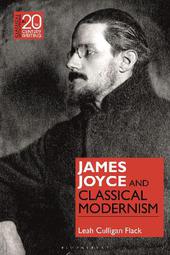
|
James Joyce and Classical Modernism
Paperback / softback
Main Details
Description
James Joyce and Classical Modernism contends that the classical world animated Joyce's defiant, innovative creativity and cannot be separated from what is now recognized as his modernist aesthetic. Responding to a long-standing critical paradigm that has viewed the classical world as a means of granting a coherent order, shape, and meaning to Joyce's modernist innovations, Leah Flack explores how and why Joyce's fiction deploys the classical as the language of the new. This study tracks Joyce's sensitive, on-going readings of classical literature from his earliest work at the turn of the twentieth century through to the appearance of Ulysses in 1922, the watershed year of high modernist writing. In these decades, Joyce read ancient and modern literature alongside one another to develop what Flack calls his classical modernist aesthetic, which treats the classical tradition as an ally to modernist innovation. This aesthetic first comes to full fruition in Ulysses, which self-consciously deploys the classical tradition to defend stylistic experimentation as a way to resist static, paralyzing notions of the past. Analysing Joyce's work through his career from his early essays, Flack ends by considering the rich afterlives of Joyce's classical modernist project, with particular attention to contemporary works by Alison Bechdel and Maya Lang.
Author Biography
Leah Culligan Flack is Associate Professor of English at Marquette University, USA. She has published widely on Joyce and modernism in articles for Modernism/Modernity, the James Joyce Quarterly, and the Classical Review, as well as her monograph Modernism and Homer: The Odysseys of H.D., James Joyce, Osip Mandelstam, and Ezra Pound (2015).
ReviewsThis volume is an essential reference tool for reception scholars interested in the ways in which Joyce engaged with the classical tradition, in turn creating a long-lasting literary legacy of his own. * The Classical Review * Leah Flack convincingly shows James Joyce's deep immersion in a classical tradition. Carefully balancing an engrossing narrative style with rigorous scholarly learning, this book is an exciting departure for studies of Joyce's fiction: a journey into myth and history, leading from Homer to #metoo, which reveals the revolutionary potential of the classics and modernism, and their enduring relevance to our present era. -- Hunter Dukes, Research Fellow in English, University of Cambridge, UK
|